中西方时间观念对比研究
各国对时间观念的差异
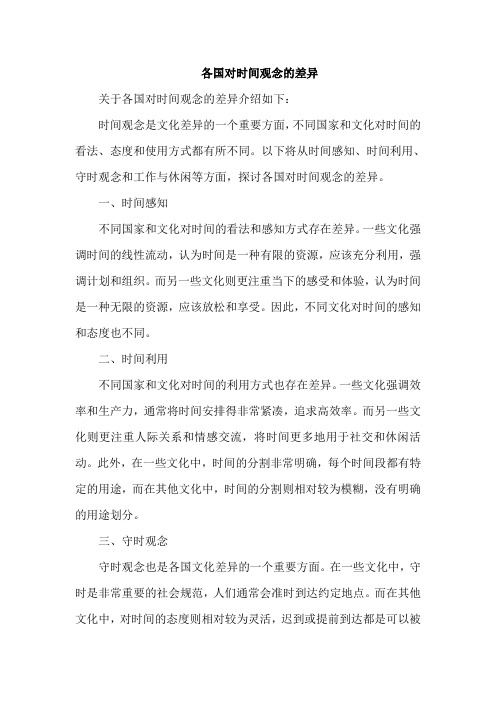
各国对时间观念的差异关于各国对时间观念的差异介绍如下:时间观念是文化差异的一个重要方面,不同国家和文化对时间的看法、态度和使用方式都有所不同。
以下将从时间感知、时间利用、守时观念和工作与休闲等方面,探讨各国对时间观念的差异。
一、时间感知不同国家和文化对时间的看法和感知方式存在差异。
一些文化强调时间的线性流动,认为时间是一种有限的资源,应该充分利用,强调计划和组织。
而另一些文化则更注重当下的感受和体验,认为时间是一种无限的资源,应该放松和享受。
因此,不同文化对时间的感知和态度也不同。
二、时间利用不同国家和文化对时间的利用方式也存在差异。
一些文化强调效率和生产力,通常将时间安排得非常紧凑,追求高效率。
而另一些文化则更注重人际关系和情感交流,将时间更多地用于社交和休闲活动。
此外,在一些文化中,时间的分割非常明确,每个时间段都有特定的用途,而在其他文化中,时间的分割则相对较为模糊,没有明确的用途划分。
三、守时观念守时观念也是各国文化差异的一个重要方面。
在一些文化中,守时是非常重要的社会规范,人们通常会准时到达约定地点。
而在其他文化中,对时间的态度则相对较为灵活,迟到或提前到达都是可以被接受的。
此外,在一些文化中,时间的精确度也被强调,而在其他文化中,时间的精确度则相对较为宽松。
四、工作与休闲各国对工作与休闲的看法也存在差异。
一些文化强调工作和生产力,认为工作是人生的重要组成部分,应该全力以赴。
而另一些文化则更注重休闲和娱乐,认为人生应该放松和享受。
此外,在工作与休闲的安排上,各国也存在差异。
一些文化通常将工作和休闲分开,而在其他文化中,工作和休闲的界限则相对较为模糊。
综上所述,各国对时间观念的差异主要表现在时间感知、时间利用、守时观念和工作与休闲等方面。
这些差异反映了不同国家和文化的价值观和生活方式,也影响了人们对时间和生活的看法和态度。
了解和尊重不同国家的时间观念差异,有助于更好地沟通和交流,促进跨文化交流和理解。
中美时间观念差异对比(商务英语专业)
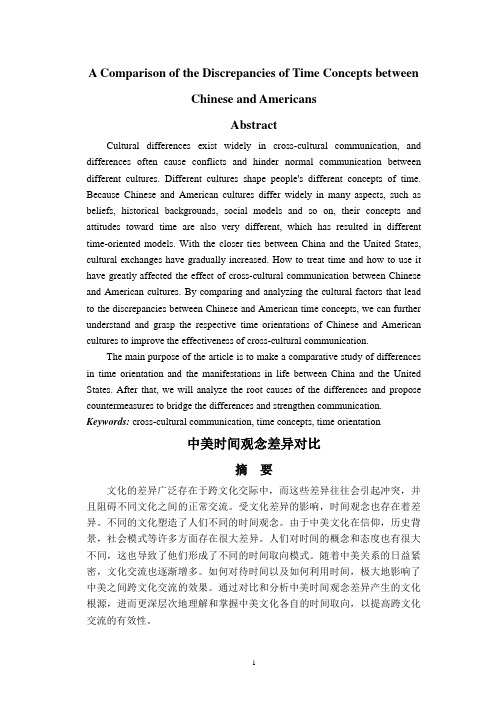
A Comparison of the Discrepancies of Time Concepts betweenChinese and AmericansAbstractCultural differences exist widely in cross-cultural communication, and differences often cause conflicts and hinder normal communication between different cultures. Different cultures shape people's different concepts of time. Because Chinese and American cultures differ widely in many aspects, such as beliefs, historical backgrounds, social models and so on, their concepts and attitudes toward time are also very different, which has resulted in different time-oriented models. With the closer ties between China and the United States, cultural exchanges have gradually increased. How to treat time and how to use it have greatly affected the effect of cross-cultural communication between Chinese and American cultures. By comparing and analyzing the cultural factors that lead to the discrepancies between Chinese and American time concepts, we can further understand and grasp the respective time orientations of Chinese and American cultures to improve the effectiveness of cross-cultural communication.The main purpose of the article is to make a comparative study of differences in time orientation and the manifestations in life between China and the United States. After that, we will analyze the root causes of the differences and propose countermeasures to bridge the differences and strengthen communication. Keywords: cross-cultural communication, time concepts, time orientation中美时间观念差异对比摘要文化的差异广泛存在于跨文化交际中,而这些差异往往会引起冲突,并且阻碍不同文化之间的正常交流。
时间观念的解析及中西方传统时间观的比较
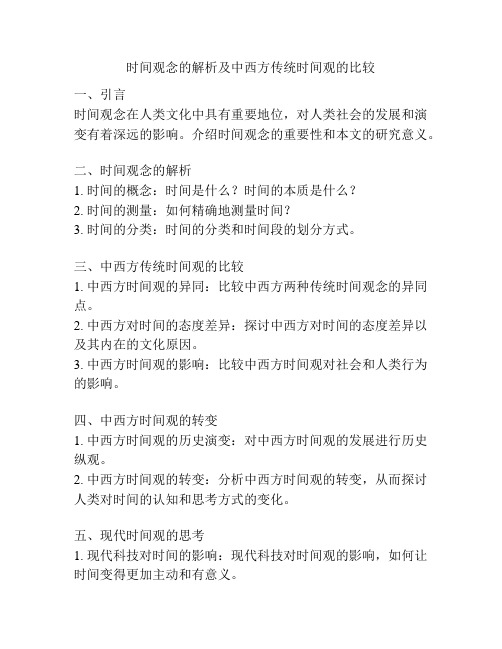
时间观念的解析及中西方传统时间观的比较一、引言时间观念在人类文化中具有重要地位,对人类社会的发展和演变有着深远的影响。
介绍时间观念的重要性和本文的研究意义。
二、时间观念的解析1. 时间的概念:时间是什么?时间的本质是什么?2. 时间的测量:如何精确地测量时间?3. 时间的分类:时间的分类和时间段的划分方式。
三、中西方传统时间观的比较1. 中西方时间观的异同:比较中西方两种传统时间观念的异同点。
2. 中西方对时间的态度差异:探讨中西方对时间的态度差异以及其内在的文化原因。
3. 中西方时间观的影响:比较中西方时间观对社会和人类行为的影响。
四、中西方时间观的转变1. 中西方时间观的历史演变:对中西方时间观的发展进行历史纵观。
2. 中西方时间观的转变:分析中西方时间观的转变,从而探讨人类对时间的认知和思考方式的变化。
五、现代时间观的思考1. 现代科技对时间的影响:现代科技对时间观的影响,如何让时间变得更加主动和有意义。
2. 个人时间观管理:探讨如何建立合理的个人时间观管理体系,做到高效利用时间。
六、结论对前面章节进行总结,进一步探讨时间观念的重要性及其对于人类社会的转型和进步所带来的启示。
第一章引言时间是世界上唯一不可逆的事物,它在人类社会中具有重要地位,对人类社会的发展和演变有着深远的影响。
时间观念是人们在长期的社会实践和思考中逐渐形成的关于时间的观念和认识。
本文旨在对时间观念进行解析,并比较中西方传统时间观的异同。
通过探讨时间观念的发展和演变,以及现代时间观的思考,进一步认识时间在人类社会和个人生活中的重要性和作用。
第二章时间观念的解析1. 时间的概念:时间是指宇宙过程中不间断的连续性,是一种通过测量来刻画的物理量。
它不可捉摸,无法具体感知,却贯穿着我们的生活。
2. 时间的测量:时间的测量是指通过一定的方法和设备,对时间的变化进行观测和记录,从而得出时间的定量结果。
人们从古至今,不断寻找更加准确的方法和工具来测量时间。
中西文化差异之时间观念差异

1、 对时间的感知与理解
其中最具代表性的理 论就是"阴阳五行说"
万事万物都要受行说认为:在 宇宙中,万物都有阴 阳两个方面、两种属 性
比如在古代哲学中就 有这样一个经典故事: 天地一阴一阳构成了 阴阳
3_中西文化差异之时间 观念差异11111
xxxxxx
-
目录 / CONTENTS
1、 对时间的感知与理 解
2、 对时间的重视和珍 惜
3_中西文化差异之时间观念差异11111
时间观念是指人们对时间的认知和态度,它反映了人们对时间的感觉和看法。中国人和西 方人在时间观念上的差异主要体现在对时间的感知、理解、重视、珍惜和利用上。中西文 化差异中,时间观念的差异是最重要的,因为它决定了我们对时间的理解、重视和珍惜
西方文化中,由于其历史起源于古希腊,人们更多地关 注于外部世界和自身的内在精神世界。由于古希腊哲学 家把外部世界看作是神所创造的,他们认为人的一切行 动都必须在神或神明面前进行,这就使他们形成了一种 "外在化"、"超越性"的时间观念。古希腊哲学家认为" 过去"、"现在"、"未来"是相互连接在一起的,就像人 可以在过去中发现未来,也可以在未来中发现过去一样
-
汇报完毕 感谢聆听
中国文化中,由于中国历史起源于农耕社会,所以中国人更关注于内在精神世界。在 中国传统文化中,时间既不是外在于人存在的客观存在,也不是与人无关的客观存在 。"过去"、"现在"和"未来"并不像西方文化中那样作为一个客观存在而存在。在中国 传统文化中,过去和未来并不是一个客观存在或独立于人而独立存在的客观存在;而 过去、现在和未来却与人密切相关,它们共同构成了一个完整的整体
中西方时间观念差异例子
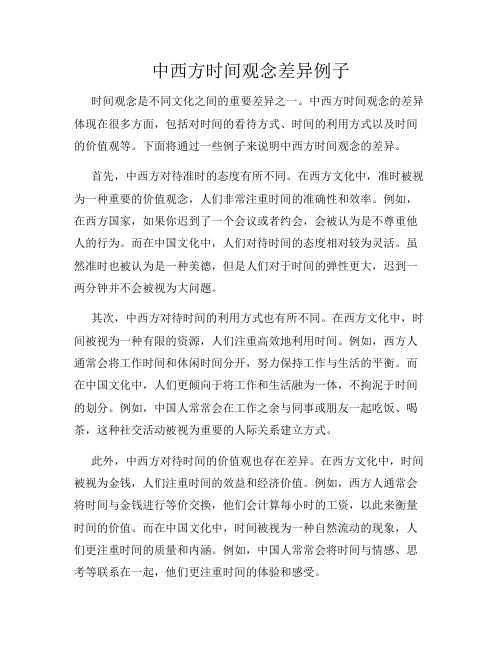
中西方时间观念差异例子时间观念是不同文化之间的重要差异之一。
中西方时间观念的差异体现在很多方面,包括对时间的看待方式、时间的利用方式以及时间的价值观等。
下面将通过一些例子来说明中西方时间观念的差异。
首先,中西方对待准时的态度有所不同。
在西方文化中,准时被视为一种重要的价值观念,人们非常注重时间的准确性和效率。
例如,在西方国家,如果你迟到了一个会议或者约会,会被认为是不尊重他人的行为。
而在中国文化中,人们对待时间的态度相对较为灵活。
虽然准时也被认为是一种美德,但是人们对于时间的弹性更大,迟到一两分钟并不会被视为大问题。
其次,中西方对待时间的利用方式也有所不同。
在西方文化中,时间被视为一种有限的资源,人们注重高效地利用时间。
例如,西方人通常会将工作时间和休闲时间分开,努力保持工作与生活的平衡。
而在中国文化中,人们更倾向于将工作和生活融为一体,不拘泥于时间的划分。
例如,中国人常常会在工作之余与同事或朋友一起吃饭、喝茶,这种社交活动被视为重要的人际关系建立方式。
此外,中西方对待时间的价值观也存在差异。
在西方文化中,时间被视为金钱,人们注重时间的效益和经济价值。
例如,西方人通常会将时间与金钱进行等价交换,他们会计算每小时的工资,以此来衡量时间的价值。
而在中国文化中,时间被视为一种自然流动的现象,人们更注重时间的质量和内涵。
例如,中国人常常会将时间与情感、思考等联系在一起,他们更注重时间的体验和感受。
最后,中西方对待时间的观念差异还体现在日常生活中的一些细节上。
例如,在西方文化中,人们通常会提前预约,以确保时间的安排。
而在中国文化中,人们更倾向于即时安排,更加注重灵活性和随机性。
另外,西方人通常会将时间分割成小块,以提高效率。
而中国人则更倾向于将时间视为一个整体,注重整体的流动和变化。
综上所述,中西方时间观念的差异体现在对待准时的态度、时间的利用方式以及时间的价值观等方面。
这些差异不仅反映了不同文化的特点,也影响着人们的生活方式和行为习惯。
中美时间观念对比
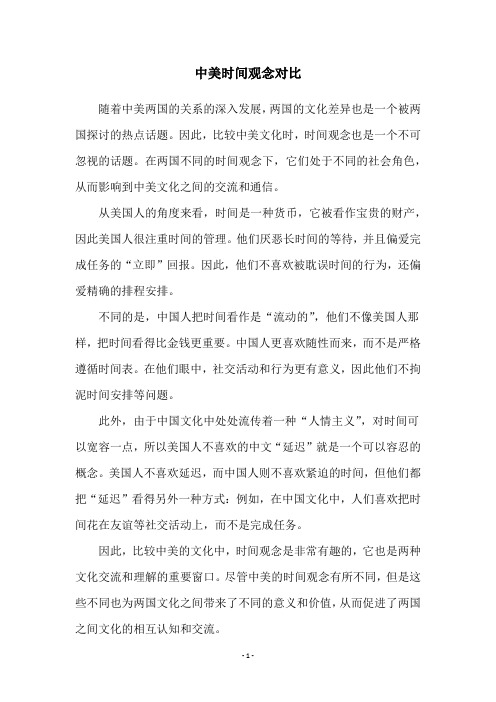
中美时间观念对比
随着中美两国的关系的深入发展,两国的文化差异也是一个被两国探讨的热点话题。
因此,比较中美文化时,时间观念也是一个不可忽视的话题。
在两国不同的时间观念下,它们处于不同的社会角色,从而影响到中美文化之间的交流和通信。
从美国人的角度来看,时间是一种货币,它被看作宝贵的财产,因此美国人很注重时间的管理。
他们厌恶长时间的等待,并且偏爱完成任务的“立即”回报。
因此,他们不喜欢被耽误时间的行为,还偏爱精确的排程安排。
不同的是,中国人把时间看作是“流动的”,他们不像美国人那样,把时间看得比金钱更重要。
中国人更喜欢随性而来,而不是严格遵循时间表。
在他们眼中,社交活动和行为更有意义,因此他们不拘泥时间安排等问题。
此外,由于中国文化中处处流传着一种“人情主义”,对时间可以宽容一点,所以美国人不喜欢的中文“延迟”就是一个可以容忍的概念。
美国人不喜欢延迟,而中国人则不喜欢紧迫的时间,但他们都把“延迟”看得另外一种方式:例如,在中国文化中,人们喜欢把时间花在友谊等社交活动上,而不是完成任务。
因此,比较中美的文化中,时间观念是非常有趣的,它也是两种文化交流和理解的重要窗口。
尽管中美的时间观念有所不同,但是这些不同也为两国文化之间带来了不同的意义和价值,从而促进了两国之间文化的相互认知和交流。
在实际工作和生活中,中美文化有着重要的不同,尤其是在时间观念上的不同。
因此,美国和中国的商务人员、学生和旅行者都应该了解这一点,以便他们在接触两种文化时也能做到相互尊重和了解。
只有这样,两国文化之间才能进一步深化理解,增进友谊。
跨文化交际中的中美时间观对比研究开题报告
一、概述1. 背景介绍我国和美国作为世界上两个最大的国家,在文化和社会制度上存在着诸多差异。
其中,时间观念作为文化的核心之一,对人们的生活和行为产生着深远的影响。
本研究旨在探讨中美两国在时间观念方面的差异,以期为跨文化交际提供一定的参考和指导。
二、中美时间观念的差异1.时间观念的概念在概念上解释时间观念的差异。
我国传统文化中,时间被理解为一个循环和节奏的概念,强调与自然的和谐统一。
而美国人则更强调时间的线性和进步性,强调时间的价值和效率。
2.时间的使用方式中美两国在时间的使用方式上存在明显的差异。
我国人更注重节省时间,强调“一寸光阴一寸金,寸金难买寸光阴”,强调时间的珍贵性。
而美国人则更加重视时间的有效利用,倡导“时间就是金钱”的观念。
3.时间观念对生活的影响中美时间观念差异对生活方式、工作习惯等方面均有深远的影响。
我国人更倾向于注重情感交流和人际关系,时间观念相对较为灵活。
而美国人更注重效率和成就,时间观念相对较为严谨。
三、中美时间观念差异的原因分析1.文化传统的影响中美时间观念的差异在很大程度上受到各自文化传统的影响。
我国传统文化中强调人与自然的和谐,时间被视为一种资源而非商品。
而美国文化则更加强调个人成就和利益,时间被视为一种可以被量化和利用的资源。
2.社会制度的影响中美两国的社会制度对时间观念也产生了影响。
我国的集体主义社会制度使得人们更加注重人际关系和情感交流,因此时间观念相对较为灵活。
而美国的个人主义社会制度导致人们更注重效率和成就,时间观念相对较为严谨。
四、跨文化交际中的挑战与应对策略1. 理解对方时间观念的差异在跨文化交际中,要充分理解对方的时间观念差异,避免因此产生误解和冲突。
2. 保持尊重和包容尊重对方的时间观念差异,积极倡导包容和理解,避免因此产生文化隔阂。
3. 寻求共同点,协调双方时间安排在交流中,可以寻求共同点,协调双方的时间安排,使得双方在时间上更加协调和融洽。
五、结论中美两国在时间观念上存在着明显的差异,这种差异对跨文化交际产生了一定的挑战。
中西方时间观念对比研究三篇
中西方时间观念对比研究三篇时间观念是人们对时间的感知,认识和反应。
由于环境、文化以及思维方式、行为方式等方面的差异,人们对时间有着不同的认知和支配方式。
时间观念能够反映一种文化的基本内涵。
因此,来自中西方不同文化背景的人们对时间有着不同的概念和态度。
如果对其他文化的时间观念没有充分的了解,理所当然地以本国的文化准则和时间观念去进行跨文化交际,那么就有可能会产生误解,导致跨文化交际失败。
因此,在跨文化交际日益频繁的今天,研究中西文化的时间观念差异就显得尤为重要。
过去和未来的时间观中国人受儒家等传统文化的影响,比较倾向于性本善之说,并且重视传统。
因此,中国人在时间取向上倾向于过去。
人们在行事时喜欢引经据典,追本溯源,以史为鉴。
相对而言,人们对未来则不太感兴趣,因为未来是难以预测和把握的。
受到这种时间取向的影响,人们崇拜祖先、尊敬老人、重视经验、默守陈规。
西方人则主要采取未来的时间取向。
他们受基督教“原罪说”影响,认为回归过去如同走向“原罪”,因此他们更愿意着眼于未来。
秉持着未来取向的时间时间观念,西方人敢于创新,善于打破常规,推陈出新。
中西方在这一时间取向上的差异表现在许多方面。
举个简单的例子,在中国古装电视剧数不胜数;而在西方国家,特别是美国,有关未来题材的各种科幻大片却层出不穷,倍受欢迎。
另一个具有代表性的差别是中西方文化对“老”这一概念的不同理解。
按照中国的传统观念,“老”意味着有年龄、有经验,是智慧和权威的象征。
但这种观念在西方却并不被认同,“老”很可能被理解为能力衰退。
因此在与西方人交流时,年龄成为了一个人们忌讳的话题。
环形与直线型的时间观不同文化对时间的看法,也可区分为直线式时间观念和环形的时间观念(关世杰,1995)。
环行的时间观念认为,时间是不断运动的圆圈,呈永恒周期性圆辐式或螺旋式运动。
例如,昼夜的交替、季节的往复、月份的轮流、年岁的更迭以及植物的周期生长、农时劳作的更替等都是循环往复、周而复始的循环运动(葛志宏,2004)。
中美时间观的对比分析剖析
Thank you !
美国-未来的时间取向
相对较短的历史,采取现在或,极少回顾过去,一切着眼于未来。
时间体系 计划和预约的不同 办公时间和私人时间的不同 中国-多向时间值
倡导在一个时间段内做很多事情,他们做事不受时间和日程安排的限制,有 较强的灵活性。
美国-单向时间值
时间不可重复,倡导特定时间段内只做一件事情,比较看重时间和日程 安排严肃地对待时间,珍惜时间,重视时效,预约、守约和准时。
时间模式 英汉时间习语的不同 交际风格的不同 中国-循环时间观
时间像一个圆圈,始终按照自然规律做着永恒周期性螺旋式运动。像自然界中的 昼夜交替,季节往复,佛教文化中的生死轮回,都是时间循环性的表现.
美国-线性时间观
时间是一种线性的单项持续运动,它包括过去、现在和将来,时刻处于变化 之中。一旦消逝便无法挽回。所以西方人使用时间十分精确,经常会精确到分秒。
文化根源
历史因素 宗教信仰 农业文化与工业文化 集体主义和个体主义
高低语境文化
应对策略
了解和学习不同文化
避免种族中心主义
培养文化移情能力 避免时间取向的文化定势
结论
通过对中美时间观的对比研究 , 可以看出在时间取 向上, 中国重视历史, 有过去的时间取向, 美国重视未来, 有将来的时间取向;中国传统的时间观以循环时间观为主, 而美国则是线性时间观 ; 在计时、用时和守时的习惯上 , 中国属于多向时间习惯 , 美国属于单向时间习惯。但本 研究只局限于定性分析,将来研究需结合定量分析,以 增强是说服力。 然而在当前的动态的全球化语境下, 旧的时间观念受到了冲击与挑战 , 时间价值观与计划性 增强, 由过去取向向未来取向转化。 一种建立在理性、 务实、效率的现代观基础上的线性的、以当下为核心并 向未来开放的时间意识逐渐为不同文化的人们所接受。 要以动态的眼光审视不同国家的时间观。
英国和中国的文化观念存在哪些异同?
英国和中国的文化观念存在哪些异同?随着全球化的加速,人们越来越意识到不同国家和不同地区的文化差异。
英国和中国是两个拥有悠久历史和文化的国家,它们之间的文化深层次的差异也备受关注。
本文将探讨英国和中国的文化观念的异同。
一、时间观念1.英国人的时间观念英国人的时间观念来自于现代工业社会的产生和发展,他们注重时间的守时和效率,以及时间与金钱的价值等。
英国人坚持时间就是金钱,因此,大多数英国人把时间看做是一种有限的、珍贵的资源,因此他们会把时间分配给一个特定的活动或人。
2.中国人的时间观念中国人的时间观念主要来自于传统文化背景下的影响,中国文化注重历史传承和传统,强调和谐共处,所以不太注重时间的精确性和效率。
在中国文化中,人类与自然和谐共存的观念非常重要,因此中国人更注重自然的节奏和时间的流动,更强调人际关系中的互信和情感的交流。
二、礼仪观念1.英国人的礼仪观念英国人非常注重礼仪,礼貌的言语和姿态在英国社会中被视为重要的社交工具。
他们更注重表达个人意愿和独立思想,而不是别人怎么看他们,因此他们看起来相对冷漠。
在英国社会中,许多礼仪规范已经成为了约定俗成的行为准则,如宴会上不能从共同的盘子里取食物,不能提及敏感话题等。
2.中国人的礼仪观念中国人非常注重礼仪,礼仪被视为维护人际关系的关键。
在中国文化中,个人信奉和传统文化的维护是一种责任和义务,因此,礼节和规则非常重要。
中国人习惯于表现出谦虚、和蔼和热情的面孔,重视集体的利益,强调群体意识,所以他们看起来更为热情和亲近。
三、态度与价值观1.英国人的态度与价值观英国人非常注重个人的隐私权和独立性。
在英国社会中,自由主义和个人主义非常流行,因此个人自由和独立意识被视为重要的价值观。
英国人重视良好的教育和专业技能,认为这些是成功的关键。
在英国社会中,强调公正和平等的价值观也非常重要。
2.中国人的态度与价值观中国人非常注重团体的意识和亲密性,家庭和社区是他们生活的一个重要支持系统。
- 1、下载文档前请自行甄别文档内容的完整性,平台不提供额外的编辑、内容补充、找答案等附加服务。
- 2、"仅部分预览"的文档,不可在线预览部分如存在完整性等问题,可反馈申请退款(可完整预览的文档不适用该条件!)。
- 3、如文档侵犯您的权益,请联系客服反馈,我们会尽快为您处理(人工客服工作时间:9:00-18:30)。
中西方时间观念对比研究comparison between the Chinese concept of time and western concept of time0ginates from agriculture civilization and industrial civilization which affect l people’s behavior,awareness Of concepts,industrial relationship,interpersonal relationship and value orientation.Different cultures breed different time conceptions and time behaviors.Today will talk about the aspects of their differences.When different time views meet with each other —cultural communication,conflicts and obstacles Of interpersonal communication may arise.1.IntroductionBecause of the social practice,ways of thinking and understanding and time of people from different cultures are different..That is to say, time ,as an objective existence,has different forms of reflection in different cultures.Time view is seen as a part of cultural deed structure,which affects people‘s perception of the world,controls their judgment and determines the ways of behaviors.The vagueness and exactness Of Chinese and western cu1ture usually lead to conflicts and misunderstanding when peop1e interact with each Other.The Chinese use time Very casually and tangibly(明确的).The Chinese prefer to say some uncertain words 1ike “at Once",”sometimes”,“a short while",which a1ways contrary to the westerners.Chinese students who are studying English tend to misuse the tense when communicating with the foreigners.The reason may be that there is no clear differentiation of the concept Of time in Chinese.When a Chinese and a westerner parted from a party,the westerner said,“I shall invite you to have a lunch one day”.And the Chinese took his words seriously and had been waiting f0r his invitation,but in Vain.So he thought the westerner was dishonest and he did not carry out his promise.In fact,such“promises”,as“we will keep in touch”and‘‘I will see you 0ne day",do not specify the time and place of the invitation and are only greetings.Because we are accustomed to such vague expressing way Of time,we tend to take them seriously.Conversely,a certain behavior also reflects certain concept of time and transmits some message about it.As a way 0f non-verbal exchange,time has its own special communicativefunction.Just as American cultural anthropologist ([ˌænθrəˈpɒlədʒɪst] 人类学家)E.T.Hall has pointed out that it has its own language,every culture owns its“time language"(Hall,l 959,p.2O).We all have such experience that when people shake hands with each other on social occasions,we can know something about their identities,relationship and status from the order of who stretches his hand first and how long the shaking has lasted.Similarly,if two sides have made an appointment to negotiate a contract at 9:00,whileone side was late and made no apology,it shows that this side is insincere or his concept of time is not ripe yet.原因:Though time is a cognitive(认知的) concept shared by the human society,because the social practice of people from different cultures and their different historical and geographical environments,people may differ in the meanings they give to time and the way they make use of time.Therefore,when people from different cultures carry out communication, time, as an invisible guide, will has a great effect on people’s words and deeds,which prevents communication from realizing its intended purpose.目的:We try to discuss the difference between time values and time behaviors of Chinese cultures and western cultures so as to analyze their impacts on the cultural communication.2.Difference1..round-trip time view Vs a linear one-directional time view环形时间观Vs直线式时间观In the oriental(东方的)world,farming is the major way of carrying out material exchange dominates all the economic life of the whole society.This pastoral civilization treats human and the nature as interrelated and interacted,the world as an integer organically linked.So the oriental society formed the round-trip time outlook that is“the nature and the human integer”.This kind Of time Out1ook thinks that time is like a circ1e and all the things in the world return to its origina1 state after a cyc1e of time,For example,the alternation of day and night,the come and go of the four seasons,the turning of the twelve months,the increase of the age and the growing of plants(JIAYu—xin,1 997,p.7 1).This kind of time View makes the oriental think that they are rich in time,which enables them to handle the time at their disposaland do things at ease.For example,when a teacher has not finished an important point in his class,he can prolong his class.At the Chinese wedding feast,few people will come at the time onthe invitation paper.The time distance between the earliest and the Iatest can be Over One hour.And the wedding feast can last two or three hours.The time of app0intment and Visiting ends is rarely certain.If a friend wh0 you have never met says he will visit you this weekend,you have to stay at home for the whole day to wait for him.The western culture usually considers time as a line and a linear 0ne-directional continuous movement.Time is m0ving on and passing.It is very precious and stubborn.Once it has passed,we cannot get it back.They a1so think that time has its beginning and end and can be measured by the clock and calendar;a certain regularized time is a point on this line and the space between two points is a period.Theref0re,the westerners use their time very exactly,1ike to the minute,in a sec0nd,and so on.Time in the western world is nearly a commodity (商品)because it is concrete and valuable.W e can buy,sell,save,waste,lose,borrow,make and measure time.There are also suggesting people how to shop,cook, clean their houses and babysit their children by using less time and achieving excellent results.2. Monochromic time system Vs.Polychromic time system单一时间习惯VS多重时间习惯Different peoples in the worId,because Of their different geographica1 environments,history and traditions,their understandings and attitudes towards time are different,which ref1ect specifically On the habits Of timing and using time.American cultural experts divided the using Of time in different cultures into two areas:One is monochromic time system and the other is polychromic time system(Hall,l 982,p.1 6).The former emphasizes schedule and punctuality.And subscription and punctuality are the customs of it.Many industrialized society adopt monochromic time system.They plan time very carefully,arrange One thing in a period of time,not easily alter the schedule and stress efficiency.The latter is very casual in timing and using time.Booking are regarded as nothing serious.Being punctual is important but not strict.Many Asian,Latin American,Arabic and African countries beIong to the Iatter.PoIychromic time system is the heritage of traditional agriculturaI society.Their people are used to doing severa1 different things at the same time and do things stressing ripe conditions.The Chinese think that everything in the wor1d develops with the cyc1ing Of time,so people stress(强调)ripe conditions when work.That is to say,each step Of our action is determined temporarily by our surroundings.So the Chinese action is poorly planned,very tangible but inefficient.The Chinese hardly subscribe in advance in the social activity.Friends and relatives can Visit each other at any time and place.In some occasions,peopIe can chat,read newspaper and work at the same time.The Chinese can go on with One thing next day that has not been finished 1ast day.The Chinese salesmen can check Out with the first customer on the one hand,and show the goods to a second one on the other hand,even greet a third One at the same time.However,the westerns can hardly accomplish them and also cannot accept them.The westerns are accustomed to doing only one thing in a specific unit time.So,caIendar,schedule,diary,annual and accounting ledger p1ay a very important ro1e in the westernwor1d.Americans are strongly controlled by time’s iron hand.They even claim themselves to be“slave to nothing but the clock”:They always feel that time are “ticking in their inner heart. There is a saying“Time is everything ’.Hall(1 982,p.20)has said:“In the western world,nobody can escape from the control Of One—way time’s iron hand.In fact,social and commercial life even sexual lives are all under time’s control. Time weave the net Of people’s life totalIy".In cross—cultural commercia1 activities,the westerners do things strictly in accordance with time table,while the Chinese stress interpersonal relationship’s harmony and ripe conditions Of things’development,not allowing the time table to interfere.So the trade of these two sides always fails because Of deadline.3 Past time 0rientation VS.future time OrientationTime orientation is a re1atively stable factor in cultura1 difference.It is connected to the historical background of the people.Generally speaking,people who have too heavy traditionload stress history and past,and their time orientation is past—oriented.We belong to past—oriented.People show great respect to the past.The past experience and 1esson are important reference for today’s success and failure.The Chinese show respect to our ancestors and teachers.We like to say things by referring to the old books and stories.That is why we call teacher“1ao shi”. Generally speaking,China is a society searching f0r quietness and stability.Unity and stability are the top priorities of every dynasty and the guarantee of social development.Contracted to the time orientation,the westerners,especially Americans,hardly look back and always look forward,so future—orientation is their important value conception.They do not put too much emphasis on the history and tradition like other peoples.everyone has the equal chance and history is not so important.If you work hard,you can succeed.They think that future is controllab1e,or at least can be affected by them.what has happened now is just preparation for the bright future.They generally believe that change means improvement and new things are superior to old things.As a result,the westerners hardly confront to the miles and worship their ancestors.Age and experience are not desired to be respected.eg.Their differentiation(区别) in time orientation makes people from China and the western world react differently towards words like “old age" and “the aged”.China is a society directed by tradition,and peop1e attach importance to age and experience because they are symbols of power and wisdom,so words like“lao'’and“da”in Chinese address a1ways mean respect.However,such honorary titles cannot be used in the western world,because in their mind,”O1d”means that their youth has passed away.If we really want to address,we must use “Respected...”Or“Senior⋯".4.Time view difference and SociaI reIationsTime View difference can affect people’s value judgment of the relationship between themselves and the outside world.For example,people have different expectations and evaluation concerning the length of interpersonal relationship’s maintaining time,like parents,children,coup1es,lovers,and friends,and so on.Americans frequently move from one place to another and their interpersonal relationship is short and changeable.0n the contrary,in China,children have too look after their aged parents until their death,friendship should be long-lasting,and residence will not easily be changed.This different cultural value expectation that has close connection with time Value has made some equal words in English and Chinese have unequal effect,like hopping,divorce and remarry.Corresponding to time View and interpersonal relationship is long-term or short—term man-thing (人为的)relationship.Materials’eternity has once been a dream to our human society.People are committed to extend the life of products in order to make them more valuable to us.But the rapidly developing western industrial civilization and fast life space have greatly changed westerners’conception.Man—thing relation becomes shorter and shorter.The modem application Of the English word“change”gives it positive meaning:Changing technology,changing concept,for a better change.The Chinese entered industrial civilization very 1ate and they still insist on the eternity and resist to reforn1.“bian"in Chinese has always been used to express the negative meaning,like“bian xin",“bian gu",“bian zhi",“bian tai"andso on.This kind of difference inevitably brings about different value judgments of their respective behavior standards.In fast-pace countries,patience is n0t highly regarded,while hurry is more favored.However,patient robust and implicit are specially emphasized.5.Changes and fusion Of Chinese time view and western time viewPeople’s time views have been formed gradually,and they are relatively stable in a long time,but they are not without changes.The better Of living conditions,the development Of the economy,the improvement Of the society and the increase of the interaction of people from different cu1tural backgrounds will undoubtedly have subt1e effects on their time Views,alth0ugh it is also a long process.with China’s joining the WTO and under the influence of globalization,peop1e’s concepts and life styles have changed a lot.The old time views are challenged and a brand new time View is in the process of formation.6. The Values and planning 0f time have been strengthenedIn a society dominated by traditional culture,time is value1ess,and peop1e can work,sing and chat at the same time.With the development of market economy and the improvement of industria1ization,the vague time system of agricultural society is required to move towards more strict and exact modern time system.The concepts that“time is money"and“efficiency is life”are gradually accepted by people.Now being late for an appointment will be regarded as unreliab1e and irresponsible,as a result,this person cannot get Others’trust.The speed Of people’s life has also increased:On the road,people are hurrying.When happen to meet an old friend,they just nod to each other,hardly stopping to have a long chat.There are less visits being paid to the neighbors.These on one hand show that people are more practical and their affection is not so good,On the other hand they also show we are more respectful Of personal space and we do not interfere others’life order casually.7.CONCLUSION: Turning from past-oriented to future-orientedWith the coming Of the new century,,the world is changing all the time,and the competition is more acute.To any nation,looking back is useless.It can only move forwards.The power of age,experience and teacher in Chinese culture begin to be challenged.When people take their past and history correctly,they are hurrying to make plans and aims for their life at the same time.In the 2 l st century,the life and future—oriented time conception that based on nationality,practicality and efficiency are gradual1y accepted by people from different culture.However,because time Views Of different society are factors of respective cu1tures,their biases are deep —rooted and it is not easy to be got rid of .So when people Of the two sides carry out cross—communication,they should be aware of this p0int and try to avoid conflicts and obstacles brought about by cultural difference Of time views,so that our communication can achieve its intended aims and we can understand each other’s culture better.作为结语Now ,the time values of both Chinese and western have impacts on each other and are gradually integrated with each Other.We need to know more about them so that we can form a better concept of time and take a better advantage of time in the future job market.。
